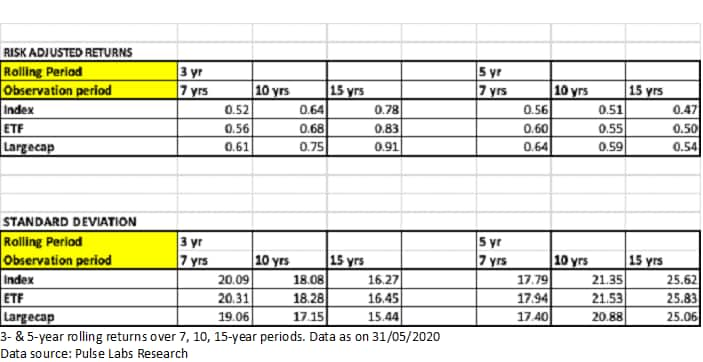Important notice: Please read carefully before accessing or downloading any training materials from this link
This is a legal agreement between you (“Licensee” or “you”or “your”) and Finsafe India Pvt. Ltd (“Licensor” or “we”) for your license of Training Materials on Financial Planning ("Training Materials") which includes printed materials and online documentation (Documentation).
By clicking on the "Agree" button on your event page, you agree to these terms which will bind you.
1.THE PRODUCT – A DESCRIPTION
We describe our products as:
Please note that we reserve the right to change the course content of the Training Materials at any time and without notice with the objective to keep the information current and relevant.
2.THE LICENCE
The license of the Training Materials to you is a non - exclusive, non-transferable licence to use the Training Materials and the Documentation on the terms set out in this agreement.
3.LICENSEE'S UNDERTAKINGS
You expressly undertake that the Training Materials and Documentation are supplied for your private information and education only. Except as expressly set out in this Licence you undertake:
(i) not to copy the Training Materials or Documentation in any form on any medium ;
(ii) not to rent, lease, sub-license, loan, translate, merge, adapt, vary or modify the Training Materials or Documentation;
(iii)not to commercially use , copy, distribute , transmit or publish whole or any part of the Training Materials or Documentation without the express written consent of the Licensor;
(iv) not to alter, or modify, the whole or any part of the Training Materials or Documentation, nor permit the Training Materials or any part of them to be combined with, or become incorporated into, any other materials.
4.INTELLECTUAL PROPERTY RIGHTS
You acknowledge that all intellectual property rights in the Training Materials and the Documentation (whether registered or not) anywhere in the world belong to the Licensor, that rights in the Training Materials and the Documentation are licensed (not sold) to you, and that you have no rights in, or to, the Training Materials or the Documentation other than the right to use them in accordance with the terms of this Licence only.
5.USE OF THE TRAINING MATERIAL AND DOCUMENTATION
You are responsible for ensuring that the device you use to access the Training Materials and Documentation meets all relevant technical specifications necessary to use the Training Materials and Documentation, is compatible with the Training Materials and Documentation and is capable of running the Training Materials and Documentation. You must not attempt to interfere in any way with the proper working of the device on which the Training Materials and Documentations run and in particular you must not attempt to circumvent security, tamper with, hack into, or otherwise disrupt any computer system, server, website, router, or any other internet connected device.
6.LICENSOR'S LIABILITY
You clearly understand that the purpose of the Training Materials and the Documentation is to encourage you to plan for your investments based on your goals and is solely meant for education purposes. There is no guarantee that your goals will be achieved. You are adviced to consult your investment / financial advisor prior to taking any investment decisions. While, every care has been taken in preparing the Training Materials and the Documentation to ensure accuracy at the time of publication and creation, however, the Licensor assumes no responsibility for any errors, which despite all precautions may be found herein. The Licensor shall not be liable under, or in connection with, this Licence or any collateral contract for:
loss of income;
loss of business profits or contracts;
business interruption;
loss of the use of money or anticipated savings;
loss of information;
loss of opportunity, goodwill or reputation;
loss of, damage to or corruption of data; or
any indirect or consequential loss or damage of any kind howsoever arising and whether caused by tort (including negligence), breach of contract or otherwise
Subject to what is provided above, the Licensor's maximum aggregate liability under or in connection with this Licence, or any collateral contract, whether in contract, tort (including negligence) or otherwise, shall be limited to the amount of license fees paid towards this License.
These terms set out the full extent of the Licensor's obligations and liabilities in respect of the supply of the Training Materials and Documentation. In particular, there are no conditions, warranties, representations or other terms, express or implied, that are binding on the Licensor except as specifically stated in this Licence.
7.TERMINATION
The Licensor may terminate this Licence immediately by written notice to you if:
you commit a material or persistent breach of this Licence which you fail to remedy (if remediable) within 3 days after the service of written notice requiring you to do so; or
Upon termination for any reason:
(i) all rights granted to you under this Licence shall cease;
(ii) you must cease all activities authorised by this Licence;
(iii) you must immediately pay to the Licensor any sums due to the Licensor under this Licence; and
(iv) you must immediately delete or remove the Training Materials or Documentation from all computer equipment in your possession, and immediately destroy or return to the Licensor (at the Licensor's option) all copies of the Training Materials and Documentation then in your possession, custody or control and, in the case of destruction, certify to the Licensor that you have done so.
8.TRANSFER OF RIGHTS AND OBLIGATIONS
This Licence is binding on you and us, and on our respective successors and assigns.
You may not transfer, assign, charge or otherwise dispose of this Licence, or any of your rights or obligations arising under it, without our prior written consent.
We may transfer, assign, charge, sub-contract or otherwise dispose of this Licence, or any of our rights or obligations arising under it, at any time during the term of the Licence.
9.EVENTS OUTSIDE OUR CONTROL
We will not be liable or responsible for any failure to perform, or delay in performance of, any of our obligations that is caused by events outside our reasonable control (Force Majeure Event).
A Force Majeure Event includes any act, event, non-happening, omission or accident beyond our reasonable control.
10.WAIVER
If we fail, at any time during the term of this Licence, to insist upon strict performance of any of your obligations, or if we fail to exercise any of the rights or remedies to which we are entitled, this shall not constitute a waiver of such rights or remedies and shall not relieve you from compliance with such obligations.
11.PRIVACY AND DATAPROTECTION
Any personal information collected by Licensor will be used by us in accordance with our
12.GENERAL
Any notice required or permitted to be given by either party to the other under these terms shall be in writing.
These terms and any document expressly referred to in them represent the entire agreement between us in relation to the license of the Training Materials and Documentation and supersede any prior agreement, understanding or arrangement between us, whether oral or in writing.
If any provision of these terms is held by any competent authority to be invalid or unenforceable in whole or in part the validity of the other provisions of these terms and the remainder of the provision in question shall not be affected thereby.
The terms are governed by the laws of India and the parties submit to exclusive jurisdiction of the courts of Bangalore.


